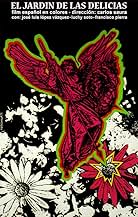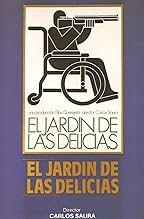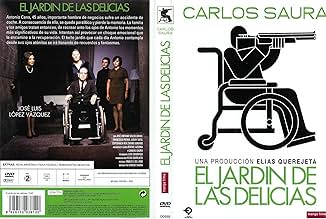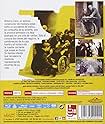IMDb RATING
6.7/10
782
YOUR RATING
A middle age construction tycoon is wheelchair-bound and amnesiac from a car accident in the company of his mistress. He alone had access to all his business's secrets, including the combina... Read allA middle age construction tycoon is wheelchair-bound and amnesiac from a car accident in the company of his mistress. He alone had access to all his business's secrets, including the combination to the safe and his Swiss bank account.A middle age construction tycoon is wheelchair-bound and amnesiac from a car accident in the company of his mistress. He alone had access to all his business's secrets, including the combination to the safe and his Swiss bank account.
- Awards
- 3 wins & 1 nomination total
Antonio Canal
- Ejecutivo
- (as Tony Canal)
Featured reviews
A fascinating mixture of fantasy, reality, sadism and tragedy. The main character, Antonio, is confined to a wheelchair, and is generally unresponsive to the world around him. His family is bent on shocking him back to reality by re-enacting various scenes from his life. It's often unclear what their real motives are. Antonio's story unfolds slowly, and each new revelation leaves you with more questions. The mix of the family's play acting, with Antonio's memories and fantasies gives the film a surrealistic air. Definitely not a up-beat film, but well worth watching.
This film was very dull and uninvolving. Perhaps it is a political allegory, for which I have no interest or understanding. Someone called it a comedy, but I didn't laugh once, nor did I noticed any attempts at humor. Most of the time I didn't know why the characters were saying what they were, if they were lying, who knew what... it was all very unresolved. Who were the man's advisaries? Who were his enemies, why?
At one point the father keeps asking "what's the Swiss bank account number?" Okay, so that shows he's greedy, but it isn't very clever or interesting or dramatic. Everybody in this film is greedy, which ruins the drama.
At one point the father keeps asking "what's the Swiss bank account number?" Okay, so that shows he's greedy, but it isn't very clever or interesting or dramatic. Everybody in this film is greedy, which ruins the drama.
Carlos Saura's "Garden of Delights" is a sly, black comedy about personal and political repression under Franco's regime. Psychodramas and shock therapy are among the tools of the trade employed to jump-start the memory of a wealthy industrialist recovering from an auto accident but still confined to a wheelchair. That his loved ones are in fact the instigators of such crude and farcical attempts to pry open the amnesiac's Swiss bank account should come as no surprise to anyone remotely familiar with Spanish history and culture. But Saura's dark tale, it seems, may proved too daunting to audiences who are unwilling to give themselves over to the film's dreamy, ruminative style that deliberately shunned "objective reality" for a subjective and interpretative approach to cinema. In Saura's view cinematic "reality" should represent the repressed state of the nation's collective consciousness and its refusal to surrender its dreams under those conditions. The debilitating conditions of fascism should not inhibit other forms of realities to exist or to challenge the prevailing political reality so that what "is" is not necessarily more important than what "should" or could have been. Scenes, real or imagined, accordingly compete for our attention throughout the narrative much as if the delights of the garden only become apparent after careful introspection and reflection. If fascism is indeed the soul of the new machine, then paralysis is just a state of the mind.
A disturbing mixture of real events, dreams, daydreams, and staged psychodramas, make this a difficult film to follow, let alone enjoy. It seems that the main character, a factory owner, has been paralyzed in a car crash in which his mistress was also injured, and his family attempts to restore him to health by various types of shock therapy. Their motives may be benign yet they are also interested in information that will give them access to Antonio's wealth. But it's not always clear what is happening to whom, nor whose viewpoint we are seeing, nor even if Antonio is recovering. And none of the characters is particularly pleasant, so you might find yourself losing interest in what happens. On the other hand, my confusion may be due to a cultural distance from Spanish surrealism (although the films of Bunuel are among my very favorites!). If you seek a new experience and are well-rested, give it a try, but there is so much more out there.
I really liked this movie. Despite the dull pace. Despite the contemptable characters. Despite the goofy surrealism. Despite the wonky music score. Despite the director's self-indulgence.
In juxtaposition, there are elements of this film that I did not like. Despite the master performance by Mr. Vazquez. Despite the interesting concept. Despite the nifty camera work.
For those who enjoy cerebral film devoid of entertainment, this one's for you. But please, do us all a favor if someone new to subtitled films invites a suggestion of what to watch, don't point them in the direction of this film.
There's a brief reference to Stevens' classic starring Taylor, Clift, and Winters.
Worth one viewing for die hard cinema junkies.
In juxtaposition, there are elements of this film that I did not like. Despite the master performance by Mr. Vazquez. Despite the interesting concept. Despite the nifty camera work.
For those who enjoy cerebral film devoid of entertainment, this one's for you. But please, do us all a favor if someone new to subtitled films invites a suggestion of what to watch, don't point them in the direction of this film.
There's a brief reference to Stevens' classic starring Taylor, Clift, and Winters.
Worth one viewing for die hard cinema junkies.
Did you know
- TriviaThe name is a reference to the Hieronymus Bosch's painting The Garden of Earthly Delights. The work is variably described as "admonition of worldly fleshy indulgence, to a dire warning on the perils of life's temptations, to an evocation of ultimate sexual joy."
- ConnectionsReferences Une place au soleil (1951)
- SoundtracksConcierto de Aranjuez
Written by Joaquín Rodrigo
Performed on guitar by Ernesto Bitetti
Conducted by José Buenagú
- How long is The Garden of Delights?Powered by Alexa
Details
- Release date
- Country of origin
- Official site
- Language
- Also known as
- The Garden of Delights
- Filming locations
- La Granjilla de La Fresneda, El Escorial, Madrid, Spain(Antonio's house and garden)
- Production company
- See more company credits at IMDbPro
Contribute to this page
Suggest an edit or add missing content

Top Gap
By what name was Le jardin des délices (1970) officially released in Canada in English?
Answer



























